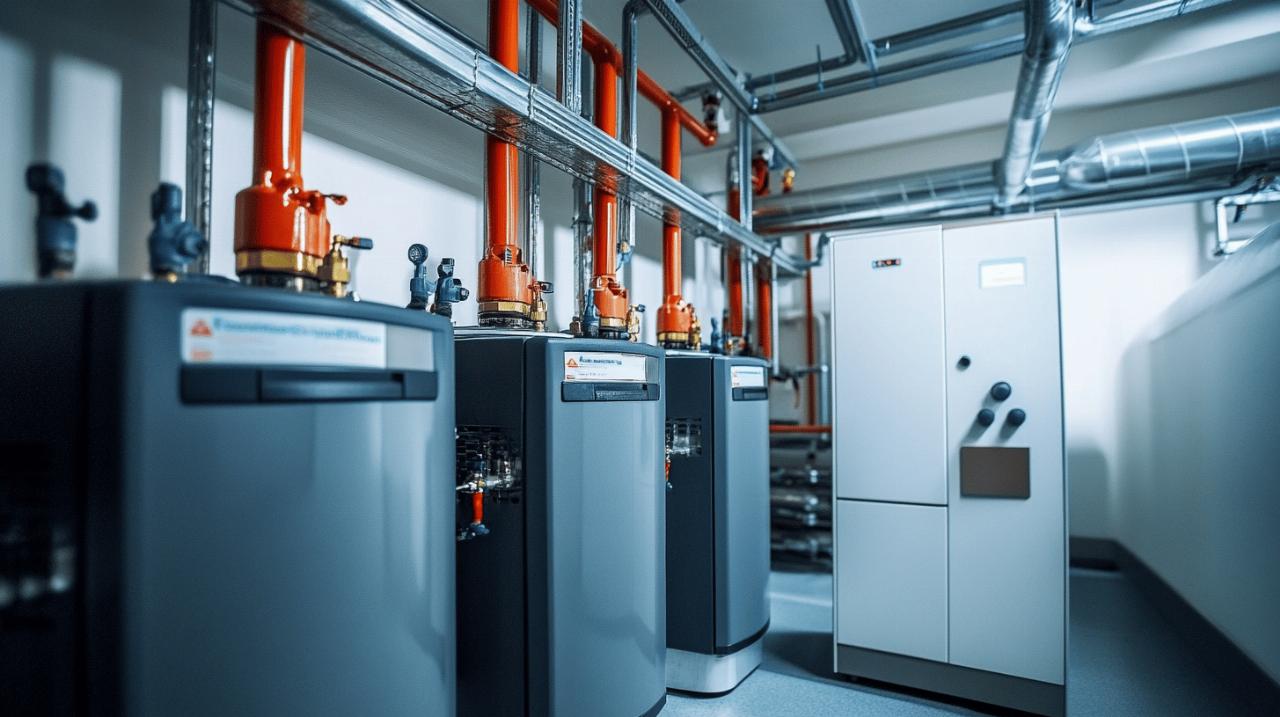The evolution of home heating technology has been remarkable, with condensing boilers emerging as a standout innovation in recent years. As homeowners become increasingly concerned about both environmental impact and rising energy costs, understanding the benefits of these advanced heating systems becomes essential. Condensing boilers represent a significant leap forward in domestic heating efficiency, offering substantial advantages over their conventional counterparts.
What makes condensing boilers different?
Condensing boilers stand apart from traditional models through their innovative approach to energy usage. Kamerolli Heating Systems, a leading provider in the industry, explains that the fundamental difference lies in how these boilers handle waste heat. Unlike conventional boilers that allow a significant portion of heat to escape through the flue, condensing models capture and reuse this valuable thermal energy, dramatically improving overall performance.
The science behind heat recovery
The exceptional efficiency of condensing boilers comes from their ability to extract what engineers call 'latent heat' from water vapour produced during the combustion process. When natural gas burns, it creates carbon dioxide, water vapour, and heat as by-products. In traditional boilers, this water vapour escapes as steam through the flue, carrying valuable thermal energy with it. Condensing boilers, however, have an additional heat exchanger that cools these exhaust gases below their dew point, which for natural gas is approximately 57 degrees Celsius. This cooling causes the water vapour to condense into liquid form, releasing substantial heat that is then transferred back into the heating system rather than being wasted.
Comparing efficiency ratings with traditional boilers
The efficiency gap between condensing and conventional boilers is substantial when measured by industry standards. Modern condensing boilers can achieve remarkable efficiency rates of up to 98%, with most operating at around 92% efficiency under optimal conditions. This performance stands in stark contrast to traditional non-condensing models, which typically reach only 70-80% efficiency. The difference becomes even more pronounced when comparing with older heating systems, where heavyweight gas boilers might operate at just 55% efficiency and lightweight models at around 65%. These efficiency figures are reflected in standardised ratings such as the ErP (Energy-related Products) scale, where modern condensing boilers must achieve at least 92% efficiency to receive an A-rating, which is now the minimum legal requirement for new installations in the UK.
Financial Benefits of Upgrading to a Condensing Boiler
The superior energy efficiency of condensing boilers translates directly into reduced utility bills, making them an attractive investment for cost-conscious homeowners. The initial outlay for a condensing boiler might be higher than a conventional model, but the long-term savings can be substantial enough to offset this difference within a relatively short timeframe.
Calculating potential savings on your gas bill
Switching to a condensing boiler can reduce gas consumption by approximately 15-20% compared to older, less efficient models. For many households, this represents a significant financial saving over the course of a year. Some sources suggest potential annual savings of up to £975 when replacing very old, inefficient heating systems with modern condensing alternatives. The exact amount saved will vary depending on several factors, including the size and insulation quality of your home, your heating habits, and the efficiency of your previous boiler. The greatest savings are typically seen when replacing G-rated boilers with new A-rated condensing models. Even when not operating in full condensing mode, these advanced boilers still maintain an efficiency advantage of 4-5% over conventional systems, ensuring year-round savings regardless of operating conditions.
Available Grants and Incentives for Installation
The transition to more energy-efficient heating has been supported by various government initiatives over the years. Historical examples include the Energy Saving Trust grant programme launched in 1996, which offered a £200 purchase grant when the additional cost of condensing boilers was approximately £400. While specific programmes have changed over time, energy efficiency remains a priority in national policy. Homeowners should investigate current schemes that might offset the installation costs, which typically range from £1,500 to £3,000 for a combi boiler replacement. Local authorities and energy companies sometimes offer additional incentives for upgrading to more efficient heating systems, particularly for vulnerable households or those in fuel poverty.
Environmental impact of condensing boilers
Beyond the financial advantages, condensing boilers make a meaningful contribution to environmental sustainability through reduced energy consumption and lower carbon emissions. As climate concerns grow, the ecological benefits of efficient home heating systems become increasingly important.
Reduction in carbon footprint
The improved efficiency of condensing boilers directly translates to a smaller carbon footprint for each household. By extracting more usable heat from the same amount of fuel, these systems reduce the overall gas consumption needed to maintain comfortable indoor temperatures. This reduction in fuel use leads to lower carbon dioxide emissions, a primary greenhouse gas contributing to climate change. When a home switches from an older non-condensing boiler to a modern condensing model, the carbon emission reduction can be substantial, helping individual households decrease their environmental impact without sacrificing comfort. The recycling of heat from exhaust gases not only saves energy but also means fewer pollutants are released into the atmosphere during the heating process.
Contributing to national emission targets
The widespread adoption of condensing boilers has made a significant contribution to national carbon reduction goals. Since becoming mandatory in 2005, condensing boilers have transformed the UK heating landscape, with nearly every gas boiler installed since 2006 being a condensing model. This transition has resulted in estimated savings of approximately 40 terawatt-hours of gas per year nationally, preventing around 8 million tonnes of carbon dioxide from entering the atmosphere annually. These figures represent a meaningful contribution to the UK's climate commitments and demonstrate how improvements in home heating technology can scale up to create substantial environmental benefits at the national level. As the country continues to work toward ambitious emission reduction targets, efficient heating systems like condensing boilers form an important part of the strategy.
Installation considerations for your home
While the benefits of condensing boilers are clear, proper installation is crucial to realizing their full potential. Several factors need to be considered when upgrading to ensure the new system is appropriate for your specific home and heating needs.
Assessing compatibility with your current system
Before installing a condensing boiler, it is essential to evaluate how well it will integrate with your existing heating infrastructure. The efficiency of condensing boilers is maximized when they can operate in condensing mode, which requires return water temperatures below the dew point. This may necessitate adjustments to your current system, such as installing larger radiators or underfloor heating that can operate effectively at lower flow temperatures. The ideal setup allows the boiler to maintain a wide temperature difference between flow and return water, known as the delta T. Modern ERP modulating pumps can help maintain this optimal temperature difference. Additionally, heating controls such as weather compensation systems, which automatically adjust flow temperature based on outdoor conditions, can significantly enhance performance, with studies showing energy consumption reductions of 15% at 3°C, 31% at 8°C, and up to 45% at 12°C outside temperature.
Choosing the Right Size and Model
Selecting an appropriately sized boiler is crucial for both efficiency and performance. Oversized boilers waste energy through excessive cycling, while undersized units may struggle to meet heating demands during cold weather. A professional heating engineer should conduct a thorough assessment of your home's heating requirements, taking into account factors such as the number of radiators, bathrooms, insulation levels, and typical hot water usage. The choice between combi, system, or regular boilers depends on your specific circumstances, including water pressure and hot water demand. For homes with water tanks, it is important not to reduce flow temperatures below 65°C to prevent legionella bacteria growth. When considering different models, pay attention to both the ErP rating and the SAP hot water efficiency score, which indicates how efficiently the boiler produces hot water for your taps.
Maintenance and longevity
To ensure your condensing boiler continues to operate at peak efficiency throughout its lifespan, regular maintenance is essential. Proper care not only maintains performance but also extends the useful life of your heating system, maximizing your return on investment.
Regular servicing requirements
Annual boiler servicing is not just a recommendation but a crucial element in maintaining efficiency and safety. During a service, a qualified engineer will clean components, check for wear and tear, ensure optimal combustion, and verify that safety systems are functioning correctly. Regular maintenance helps prevent the buildup of soot and debris that can reduce heat transfer efficiency and increase fuel consumption. The service should include inspection of the condensate drain, a component unique to condensing boilers that can become blocked, particularly during cold weather. Some manufacturers may require annual servicing as a condition of their warranty, making this maintenance not just good practice but potentially a contractual obligation. The small cost of annual servicing is typically offset by the efficiency benefits and extended equipment life it provides.
Maximising your boiler's lifespan
With proper care, a quality condensing boiler can provide reliable service for many years. To maximize lifespan, homeowners should consider several operational practices beyond regular professional servicing. Maintaining appropriate system pressure and ensuring the heating system is properly balanced can reduce strain on the boiler. If your system includes a pre-heat function, consider turning it off when not needed to reduce unnecessary cycling and energy use. For optimal condensing operation, experts recommend setting flow temperatures between 60-65°C rather than the default 80°C often used in installations. This lower temperature not only improves efficiency but can also reduce wear on components. It is worth noting that if you already have a functioning condensing boiler, replacing it solely for efficiency gains may not be cost-effective. Instead, consider improving your heating system's performance through better insulation, upgraded controls, or optimizing your existing setup before contemplating a replacement.
